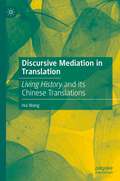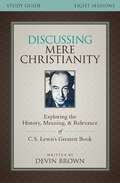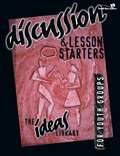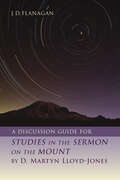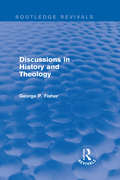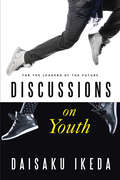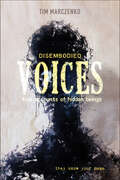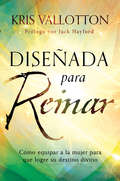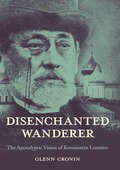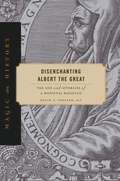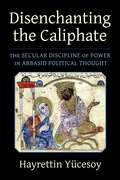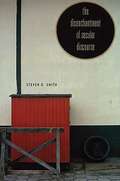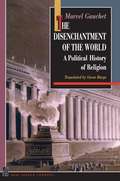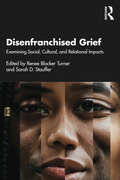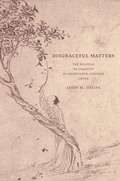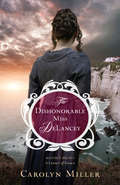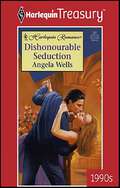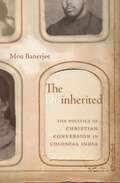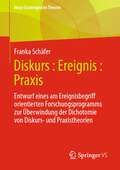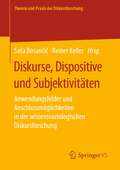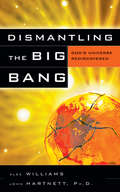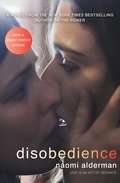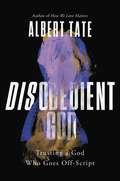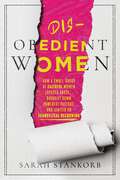- Table View
- List View
Discursive Mediation in Translation: Living History and its Chinese Translations
by Hui WangThis book explores the actual process of mediation operation in the translation process and the interaction between mediation and social structure. It defines mediation in translation in a parameterized manner, characterizing the linguistic properties of mediation for ease of mediation identification. On this basis, it puts forward an integrated systematic approach to map out mediation operation at the text level and discuss the interactive relationship between mediation and social structure, with a view to unveiling how the source text is altered for the purpose of power balance in the translation process. It is a key read for those interested in better understanding of how translators mediate in the translation process so as to maneuver a text to achieve a certain purpose, thereby increasing mediation efficiency and avoiding potential pitfalls in mediation operation. It will be of interest to students and scholars in translation studies, professional translators, as well as those working in language and culture, intercultural communication, and cultural studies.
Discussing Mere Christianity Study Guide: Exploring the History, Meaning, and Relevance of C.S. Lewis's Greatest Book
by Devin BrownIn this eight-session video group study (DVD/digital video sold separately), you will discover why Mere Christianity by C.S. Lewis is one of the most read and beloved Christian books of all time. But seventy years later from when it was first delivered on radio, what relevance does it have to our world today? Host Eric Metaxas and a variety of Christian leaders−including Philip Yancey, Alister McGrath, Devin Brown, Paul McCusker, Douglas Gresham, and others−help us understand the timeless message of C. S. Lewis in fresh ways for a new generation.The first purpose of this video study is to explore the positive ideas that C.S. Lewis has so eloquently written about in Mere Christianity for those who already call themselves Christian. The second purpose is to explain in an engaging, winsome and non-threatening way the basic tenets of the Christian faith as illustrated by C.S. Lewis to those who do not claim to be Christian. This study aims to fulfill the vision of C.S. Lewis of reaching people from all faith backgrounds.Sessions include:Our Sense of Right and WrongWhat's Behind Our Sense of Right and WrongThe Rival Conceptions of GodFree Will and the Shocking AlternativeChristian Behavior and the Great Sin of PrideThe Christian Virtue of HopeGod in Three PersonsCounting the CostDesigned for use with the Discussing Mere Christianity Video Study 9780310699859 (sold separately).
Discussion and Lesson Starters (The Ideas Library)
by Youth SpecialtiesMore than 200 proven openers, questions, and activities that get students involved in your lessons! - A Primer on Leading Discussions . . . Starting a discussion, and keeping it going . . . The importance of confidentiality . . . Asking questions that get responses . . . And working with different personalities. - 35 Creative ways to start a discussion or lesson on any topic . . .Techniques general enough to fit just about any subject, but still quirky enough to attract adolescent attention. - Discussion & Lesson Starters, By Topic . . . What subject are you teaching this week? First, look up your subject -- apologetics, attitude, dating, disabilities, faith, family, the will of God . . . And more than 30 main topics, all arranged alphabetically. Then choose the opener that fits your purposes and your group. In fact, many of these openers are virtually complete lessons in themselves, with questions, activities, parables, object lessons -- all designed to draw opinions, thoughts, and feelings from your students. Whether you're a youth worker or recreation director in a church, school, club, or camp -- Discussion & Lesson Starters is your storehouse of proven, youth-group tested ideas.
A Discussion Guide for STUDIES IN THE SERMON ON THE MOUNT by D. Martyn Lloyd-Jones
by J.D. FlanaganRediscover a spiritual classic.Since its publication over half a century ago, Studies in the Sermon on the Mount by D. Martyn Lloyd-Jones has inspired generations of Christian readers. Now, J. D. Flanagan revisits Lloyd-Jones&’s classic work of exegesis with this fresh discussion guide.Moving chapter by chapter through Studies in the Sermon on the Mount, Flanagan&’s detailed study guide encourages readers to consider both what the Scripture passage says and how Lloyd-Jones explicates it. Together, Studies and this guide expound on the meaning of Jesus&’s iconic sermon and its implications for the life of faith. Flanagan&’s work encourages readers to apply their reflections to issues that face Christians today.This book includes discussion questions, practical exercises, and scriptural and literary citations.
Discussions in History and Theology (Routledge Revivals)
by George P. FisherFirst published in 1880, this is a fascinating collection of essays by the nineteenth-century theologian and historian George P. Fisher, arranged into three key classifications. The first group comprises papers that relate to the history, polity and dogmas of the Roman Catholic Church, with a particular focus on how the religion of ancient Rome reappears in the characteristic features of Latin Christianity. The second group of essays relates to the New England theology that was pioneered by Jonathan Edwards and entailed important modifications to the philosophy of Calvinism. Unitarianism is also discussed in detail, which is the subject of a paper on Channing, who was regarded as the most prominent representative of the movement in America. The third set of essays explores Theism and Christian evidences, with papers presenting analyses of rationalistic theory, Atheism, and the intellectual and spiritual career of the Apostle Paul. A fascinating and comprehensive collection, this important reissue will be of particular value to students interested in the interplay between history and Christian theology.
Discussions on Youth: For the Leaders of the Future (For the Leaders of the Future)
by Daisaku IkedaIn a straightforward question-and-answer format, Buddhist teacher Daisaku Ikeda responds to the complicated issued facing American young people. Addressing adolescents as the leaders of the future, Ikeda touches on topics of peace, human rights, and environmental degredation as he urges young people with warmth and understanding to see the great potential they have as the hope for humanity. The book also provides easy-to-understand explanations of Nichiren Buddhism and the benefits of its practice.
Discussions on Youth (For Leaders of the Future)
by Daisaku IkedaDaisaku Ikeda, who offers spiritual leadership to 12 million Soka Gakkai Buddhists throughout the world, responds to the complicated issues facing American young people in a straight-forward question and answer format. Expanding on his popular The Way of Youth, he addresses young people as being the leaders of the future, and with warmth and understanding he urges young people to see the great potential they have as the hope for humanity. The book also provides easy-to-understand explanations of Nichiren Buddhism and the benefits of practice.
Disembodied Voices: True Accounts of Hidden Beings
by Tim MarczenkoA paranormal investigator reveals evidence of mysterious voices that communicate with us—and hair-raising theories about who they are and what they want. For millennia, people have had encounters with voices that seem to come from nowhere. These disembodies voices have haunted and helped us, inspired and scared us. But few have stepped forward to discuss the phenomenon. Now Tim Marczenko reveals true stories from his extensive investigation into real-life encounters with disembodied voices, as well as historical accounts and his own personal experiences. With objectivity and healthy skepticism, Tim explores theories about why these voices exist, where they may be coming from, and what their agendas may be. Are they forgotten woodland deities? Is it an ancient evil from the days of Eden? Is there a single intelligence behind them all . . . or perhaps we shouldn&’t look too deeply . . . or else . . .
Diseñada para reinar: Cómo equipar a la mujer para que logre su destino divino
by Kris VallottonEs hora de una revolución La mujer fue extraída del hombre en el jardín del Edén para que permaneciera a su lado y reinara con él. Satanás, sin embargo, se las ha ingeniado para despojar a las mujeres y los hombres de sus legítimas identidades, menoscabándolos y privándolos de su poder original. El mundo implora para que esta asociación original divina sea restablecida a su equilibrio primigenio, lo cual es posible. Únase a Kris Vallotton en un viaje extraordinario que abrirá su entendimiento, y que incluye: - El verdadero plan y propósito de Dios para las mujeres - Las enseñanzas radicales de Jesús y su especial preocupación por las mujeres - El importante papel de los hombres en la restauración de las mujeres - La verdadera interpretación de pasajes bíblicos difíciles relacionados con las mujeres - Ejemplos de mujeres en el liderazgo, según el propósito de Dios Dios diseñó a las mujeres para que reinaran juntamente con los hombres. Jesús nos libertó para que asumiéramos nuestras verdaderas identidades. Es hora de que todos, como hijos e hijas del Rey, gobernemos juntos. ¡PREPARESE Y SEA PARTICIPE DE ESTA REVOLUCION!
Disenchanted Wanderer: The Apocalyptic Vision of Konstantin Leontiev (NIU Series in Slavic, East European, and Eurasian Studies)
by Glenn CroninDisenchanted Wanderer is the first comprehensive English-language study in over half a century of the life and ideas of Konstantin Nikolaevich Leontiev (1831–1891), one of the most important thinkers in nineteenth-century Russia on political, social, and religious matters. Glenn Cronin gives the reader a broad overview of Leontiev's life and varied career as novelist, army doctor, diplomat, journalist, censor, and, late in life, ordained monk. Reviewing Leontiev's creative work and his writing on aesthetics and literary criticism—notable figures such as Belinsky, Turgenev, Gogol, Dostoevsky, and Tolstoy appear—Cronin goes on to examine Leontiev's sociopolitical writing and his theory of the rise and fall of cultures and civilizations, placing his thought in the context of his contemporaries and predecessors including Hegel, Herzen, and Nietzsche, as well as Danilevsky, Pobedonostsev, and other major figures in Slavophile and Russian nationalist circles.Cronin also examines Leontiev's religious views, including his ascetic brand of Orthodoxy, informed by his experiences of the monastic communities of Mount Athos and OptinaPustyn, and his late attraction to Roman Catholicism under the influence of the theologian Vladimir Solovyev. Disenchanted Wanderer concludes with a review of Leontiev's prophetic vision for the twentieth century and his conviction that, after a period of wars, socialism would triumph under the banner of a new Constantine the Great. Cronin considers how far this vision foretold the rise to power of Joseph Stalin, an aspect of Leontiev's legacy that previously had not received the attention it merits.Elevating Leontiev to his proper place in the Russian literary pantheon, Cronin demonstrates that the man was not, as is often maintained, an amoralist and a political reactionary but rather a deeply moral thinker and a radical conservative.
Disenchanting Albert the Great: The Life and Afterlife of a Medieval Magician (Magic in History)
by David J. Collins, S. J.Albert the Great (1200–1280) was a prominent Dominican friar, a leading philosopher, and the teacher of Thomas Aquinas. He also endorsed the use of magic. Controversial though that stance would have been, Albert was never punished or repudiated for what he wrote. Albert’s reception followed instead a markedly different course, leading ultimately to his canonization by the Catholic Church in 1931. But his thoughts about magic have been debated for centuries. Disenchanting Albert the Great takes Albert’s contested reputation as a case study for the long and complex history surrounding the concept of magic and magic’s relationship to science and religion. Over the centuries, Albert was celebrated for his magic, or it was explained away—but he was never condemned. In the fifteenth century, members of learned circles first attempted to distance Albert from magic, with the goal of exonerating him of superstition, irrationality, and immorality. Disenchanting Albert the Great discusses the philosopher’s own understanding of magic; an early, adulatory phase of his reputation as a magician; and the three primary strategies used to exonerate Albert over the centuries. In the end, Disenchanting Albert the Great tells the story of a thirteenth-century scholar who worked to disenchant the natural world with his ideas about magic but who himself would not be disenchanted until the modern era. This accessible and insightful history will appeal to those interested in Albert the Great, Catholic Church history, the history of magic, and Western understandings of the natural and the rational over time.
Disenchanting the Caliphate: The Secular Discipline of Power in Abbasid Political Thought (Columbia Studies in International and Global History)
by Hayrettin YücesoyThe political thought of Muslim societies is all too often defined in religious terms, in which the writings of clerics are seen as representative and ideas about governance are treated as an extension of commentary on sacred texts. Disenchanting the Caliphate offers a groundbreaking new account of political discourse in Islamic history by examining Abbasid imperial practice, illuminating the emergence and influence of a vibrant secular tradition.Closely reading key eighth-century texts, Hayrettin Yücesoy argues that the ulema’s discourse of religious governance and the political thought of lay intellectuals diverged during this foundational period, with enduring consequences. He traces how notions of good governance and reflections on prudent statecraft arose among cosmopolitan literati who envisioned governing as an art. Competent in nonreligious branches of knowledge and trained in administrative professions, these belletrists articulated and defended secular political practices, reimagining the caliphal realm as politically constituted rather than natural. They sought to improve administrative efficiency and bolster state control for an empire made up of diverse cultures. Their ideas about moral cultivation, temporal reasoning, and governmental rationality endured for centuries as a counterpoint to religious rulership. Drawing on this history, Yücesoy critiques the concept of “Islamic political thought,” calling for decolonizing debates about “secular” and “religious” politics.Theoretically rich and historically grounded, Disenchanting the Caliphate is an insightful and provocative reconsideration of key strands of political discourse in the intellectual history of Muslim societies.
The Disenchantment Of Secular Discourse
by Steven D. SmithProminent observers complain that public discourse in America is shallow and unedifying. This debased condition is often attributed to, among other things, the resurgence of religion in public life. Steven Smith argues that this diagnosis has the matter backwards: it is not primarily religion but rather the strictures of secular rationalism that have drained our modern discourse of force and authenticity.
The Disenchantment of the World: A Political History of Religion
by Marcel GauchetMarcel Gauchet has launched one of the most ambitious and controversial works of speculative history recently to appear, based on the contention that Christianity is "the religion of the end of religion." In The Disenchantment of the World, Gauchet reinterprets the development of the modern west, with all its political and psychological complexities, in terms of mankind's changing relation to religion. He views Western history as a movement away from religious society, beginning with prophetic Judaism, gaining tremendous momentum in Christianity, and eventually leading to the rise of the political state. Gauchet's view that monotheistic religion itself was a form of social revolution is rich with implications for readers in fields across the humanities and social sciences.Life in religious society, Gauchet reminds us, involves a very different way of being than we know in our secular age: we must imagine prehistoric times where ever-present gods controlled every aspect of daily reality, and where ancestor worship grounded life's meaning in a far-off past. As prophecy-oriented religions shaped the concept of a single omnipotent God, one removed from the world and yet potentially knowable through prayer and reflection, human beings became increasingly free. Gauchet's paradoxical argument is that the development of human political and psychological autonomy must be understood against the backdrop of this double movement in religious consciousness--the growth of divine power and its increasing distance from human activity.In a fitting tribute to this passionate and brilliantly argued book, Charles Taylor offers an equally provocative foreword. Offering interpretations of key concepts proposed by Gauchet, Taylor also explores an important question: Does religion have a place in the future of Western society? The book does not close the door on religion but rather invites us to explore its socially constructive powers, which continue to shape Western politics and conceptions of the state.
Disenfranchised Grief: Examining Social, Cultural, and Relational Impacts
by Renee Blocker Turner Sarah D. StaufferDisenfranchised Grief expands the professional helper’s understanding of the grief experiences that result from social, cultural, and relational oppression, microaggressions, disempowerment, and overt violence. The authors blend trauma-informed practice and recent research on critical race theory, cultural humility, and intersectionality to both broaden mental health professionals’ conceptualization of disenfranchised grief and its impacts and promote equity and inclusion among populations that have been marginalized.
The Dishonorable Miss DeLancey (Regency Brides #3)
by Carolyn MillerWill a damaged reputation and desire for society's approval thwart the legacy of grace?Tainted by scandal and forced to leave London for the quieter Brighton countryside, the Honorable Miss Clara DeLancey is a shadow of her former society self. She's lost the man she loved to another and, in a culture that has no patience for self-pity, is struggling with depression. A chance encounter brings her a healing friendship with the sisters of an injured naval captain. But Clara's society mama is appalled at the new company she's keeping.Captain Benjamin Kemsley is not looking for a wife. But his gallant spirit won't let him ignore the penniless viscount's daughter--not when she so obviously needs assistance to keep moving forward from day to day. Can he protect his heart and still keep her safe?When they're pushed into the highest echelons of society at the Prince Regent's Brighton Pavilion, this mismatched couple must decide if family honor is more important than their hopes. Can they right the wrongs of the past and find future happiness together--without finances, family support, or royal favor?The Dishonorable Miss DeLancey is full of the captivating, flawed characters, fascinating historical details, and masterful writing that Carolyn Miller's fans have come to know in The Elusive Miss Ellison and The Captivating Lady Charlotte. If you love Lori Wick, Georgette Heyer, and other clean, wholesome Regency romance, you'll love this third book in the Regency Brides: A Legacy of Grace series.
Dishonourable Seduction
by Angela Wells"Every woman does have her price."Steel Anastasi's cynicism appalled Ginny-but she couldn't walk away from his offer. It was up to her to ensure that the company survived, even if that meant enduring interference from the handsome Greek!But Ginny had a feeling Steel might not play fair.... He was a master of manipulation, and clearly had his own agenda. What did Ginny really mean to him? And were his intentions strictly honourable? One thing was certain-she was about to find out!
The Disinherited: The Politics of Christian Conversion in Colonial India
by Mou BanerjeeAn illuminating history of religious and political controversy in nineteenth-century Bengal, where Protestant missionary activity spurred a Christian conversion “panic” that indelibly shaped the trajectory of Hindu and Muslim politics.In 1813, the British Crown adopted a policy officially permitting Protestant missionaries to evangelize among the empire’s Indian subjects. The ramifications proved enormous and long-lasting. While the number of conversions was small—Christian converts never represented more than 1.5 percent of India’s population during the nineteenth century—Bengal’s majority faith communities responded in ways that sharply politicized religious identity, leading to the permanent ejection of religious minorities from Indian ideals of nationhood.Mou Banerjee details what happened as Hindus and Muslims grew increasingly suspicious of converts, missionaries, and evangelically minded British authorities. Fearing that converts would subvert resistance to British imperialism, Hindu and Muslim critics used their influence to define the new Christians as a threatening “other” outside the bounds of authentic Indian selfhood. The meaning of conversion was passionately debated in the burgeoning sphere of print media, and individual converts were accused of betrayal and ostracized by their neighbors. Yet, Banerjee argues, the effects of the panic extended far beyond the lives of those who suffered directly. As Christian converts were erased from the Indian political community, that community itself was reconfigured as one consecrated in faith. While India’s emerging nationalist narratives would have been impossible in the absence of secular Enlightenment thought, the evolution of cohesive communal identity was also deeply entwined with suspicion toward religious minorities.Recovering the perspectives of Indian Christian converts as well as their detractors, The Disinherited is an eloquent account of religious marginalization that helps to explain the shape of Indian nationalist politics in today’s era of Hindu majoritarianism.
Diskurs: Entwurf eines am Ereignisbegriff orientierten Forschungsprogramms zur Überwindung der Dichotomie von Diskurs- und Praxistheorien (Neue Soziologische Theorie)
by Franka SchäferMit Diskurs : Ereignis : Praxis legt die Autorin ein dynamisches Theorieprogramm für eine diskurstheoretisch informierte und am Ereignisbegriff orientierte Soziologie der Praxis vor. Sie skizziert die soziologische Relation zwischen den Begriffen Diskurs, Ereignis und Praxis, diagnostiziert deren in Schräglage geratenes Verhältnis und erklärt die Dynamisierung der dichotomen Konzeptionen zum leitenden Prinzip ihrer Argumentation. Durch eine Rekonstruktion der diskurstheoretischen Grundlagen, praxistheoretischen Bedingungen, der Situation der Methodendiskussion sowie der Ausgangslage soziologischer Protestforschung, formiert sie die Basis des Forschungsprogramms und markiert die Frage der Assoziation von Diskursen und Praktiken als Leerstelle, welche am Beispiel der Protestforschung expliziert wird. Kern des Buches ist die differenzierte Auseinandersetzung mit dem Ereignisbegriff, der ausgehend von der Foucaultschen Prägung als Hauptumschlagsbasis weiterentwickelt und in einen Ereignisbegriff überführt wird, der ein Dichotomien überwindendes Verhältnis von Diskurs und Praxis in einem poststrukturalistischen Materialismus gewährleistet. Das Potential des Programms liegt zudem in der Erweiterung der Praxisforschung um eine explizite Macht- und Herrschaftsperspektive, die mit einer Analyse der Praxis des Widerständigen am Beispiel des Yippie Festival of Life vor Augen geführt wird.
Diskurse, Dispositive und Subjektivitäten: Anwendungsfelder und Anschlussmöglichkeiten in der wissenssoziologischen Diskursforschung (Theorie und Praxis der Diskursforschung)
by Saša Bosančić Reiner KellerDie Wissenssoziologische Diskursanalyse (WDA) zeichnet sich durch interdisziplinäre Zugänge sowie durch die Möglichkeit vielfältiger theoretischer und methodologischer Modifikationen in unterschiedlichen Forschungsfeldern aus, wie in den ersten beiden Bänden zur wissenssoziologischen Diskursforschung dokumentiert ist. Die WDA formuliert dabei eine theoretisch-methodologische Perspektive, die die Diskurs- und Subjekttheorien Michel Foucaults im Interpretativen Paradigma der Soziologie situiert und damit die methodologischen Grundlagen für die empirische Forschung eröffnet. Jedoch schlägt die WDA kein festes Ablaufschema im Sinne eines 'Rezeptwissens' zur Durchführung von empirischen Studien vor, vielmehr werden sensibilisierende und heuristische Konzepte vorgeschlagen, die vor dem Hintergrund der jeweiligen (inter)disziplinären Verortungen und Forschungsinteressen spezifiziert werden können.
Dismantling the Big Bang: God's Universe Rediscovered
by Alexander Williams Dr John HartnettWhy did Ptolemy's theory cause problems for the church? What is the big secret concerning the "?Age" of the earth? Why do many scientists reject the use of design in explaining origins? The seemingly absurd idea that all matter, energy, space, and time once exploded from a point of extreme density has captured the imagination of scientists and laypersons for decades. The big bang has provided a central teaching for the eons of time of "cosmic evolution", undermining the history and cosmology of the Bible. It is a theory that fails, even violating the very physical laws on which it is purportedly based.In this easy-to-read format, authors Alex Williams and John Hartnett explode this naturalistic explanation for the universe, and show that the biblical model provides a far better explanation of our origins. This fully indexed, illustrated analysis of the big bang theory is an invaluable help in understanding and countering a world view that is as chaotic and destructive as its name implies.
Disobedience: A Novel
by Naomi Alderman*NOW A MAJOR MOTION PICTURE, STARRING RACHEL WEISZ AND RACHEL MCADAMS *AUTHOR OF ONE OF BARACK OBAMA&’S FAVORITE READS From the New York Times bestselling author of The Power comes a novel about a young woman who must return home in the wake of her father&’s death and confront the tight-knit Orthodox community that she ran away from—reigniting the old flames of forbidden love.When a young photographer living in New York learns that her estranged father, a well-respected rabbi, has died, she can no longer run away from the truth, and soon sets out for the Orthodox Jewish community in London where she grew up. Back for the first time in years, Ronit can feel the disapproving eyes of the community. Especially those of her beloved cousin, Dovid, her father&’s favorite student and now an admired rabbi himself, and Esti, who was once her only ally in youthful rebelliousness. Now Esti is married to Dovid, and Ronit is shocked by how different they both seem, and how much greater the gulf between them is. But when old flames reignite and the shocking truth about Ronit and Esti&’s relationship is revealed, the past and present converge in this award-winning and critically acclaimed novel about the universality of love and faith, and the strength and sacrifice it takes to fight for what you believe in—even when it means disobedience.
Disobedient God: Trusting a God Who Goes Off-Script
by Albert TateIn this powerful guidebook, the lead pastor of Fellowship Church demonstrates how the moments that test our faith are the moments God uses to direct our hearts to the one thing we truly desire most: a relationship with Christ. When the people of Israel, those who had witnessed the most abundant and inexplicable acts of God, grew tired of waiting for Moses to come off the mountain, they made a calf of gold. It was easier for them to make a new god than to continue serving a God that didn&’t conform to their schedule and expectations. Just like the Israelites in the desert, we are all fundamentally longing for God… but who and what are we actually reaching for and serving? Disobedient God addresses the things we do when we feel ignored, inconvenienced and frustrated by God. What things are we reaching for in our life? Are we reaching for porn when we long for intimacy? Reaching for success when we long for security? We would never say that we have replaced God, but our actions tell a different story. Whether we are trying to replace God, trying to run away or trying to perform for Him, we have no mindset to deal with a disobedient God. Disobedient God is a book for people dealing with this disappointment and interested in properly understanding and loving the God they&’ve misunderstood. This is not a step-by-step instruction manual for how to react when things are difficult; rather, it is a way of understanding God that leads people to discover the relationship with God that they were always meant for.
Disobedient Women: How a Small Group of Faithful Women Exposed Abuse, Brought Down Powerful Pastors, and Ignited an Evangelical Reckoning
by Sarah StankorbA NATIONAL BESTSELLER! Journalist Sarah Stankorb outlines how access to the internet—its networks, freedom of expression, and resources for deeply researching and reporting on powerful church figures—allowed women to begin dismantling the false authority of evangelical communities that had long demanded their submission. A generation of American Christian girls was taught submitting to men is God&’s will. They were taught not to question the men in their families or their pastors. They were told to remain sexually pure and trained to feel shame if a man was tempted. Some of these girls were abused and assaulted. Some made to shrink down so small they became a shadow of themselves. To question their leaders was to question God. All the while, their male leaders built fiefdoms from megachurches and sprawling ministries. They influenced politics and policy. To protect their church&’s influence, these men covered up and hid abuse. American Christian patriarchy, as it rose in political power and cultural sway over the past four decades, hurt many faithful believers. Millions of Americans abandoned churches they once loved. Yet among those who stayed (and a few who still loved the church they fled), a brave group of women spoke up. They built online megaphones, using the democratizing power of technology to create long-overdue change. In Disobedient Women, journalist Sarah Stankorb gives long-overdue recognition for these everyday women as leaders and as voices for a different sort of faith. Their work has driven journalists to help bring abuse stories to national attention. Stankorb weaves together the efforts of these courageous voices in order to present a full, layered portrait of the treatment of women and the fight for change within the modern American church.Disobedient Women is not just a look at the women who have used the internet to bring down the religious power structures that were meant to keep them quiet, but also a picture of the large-scale changes that are happening within evangelical culture regarding women&’s roles, ultimately underscoring the ways technology has created a place for women to challenge traditional institutions from within.
